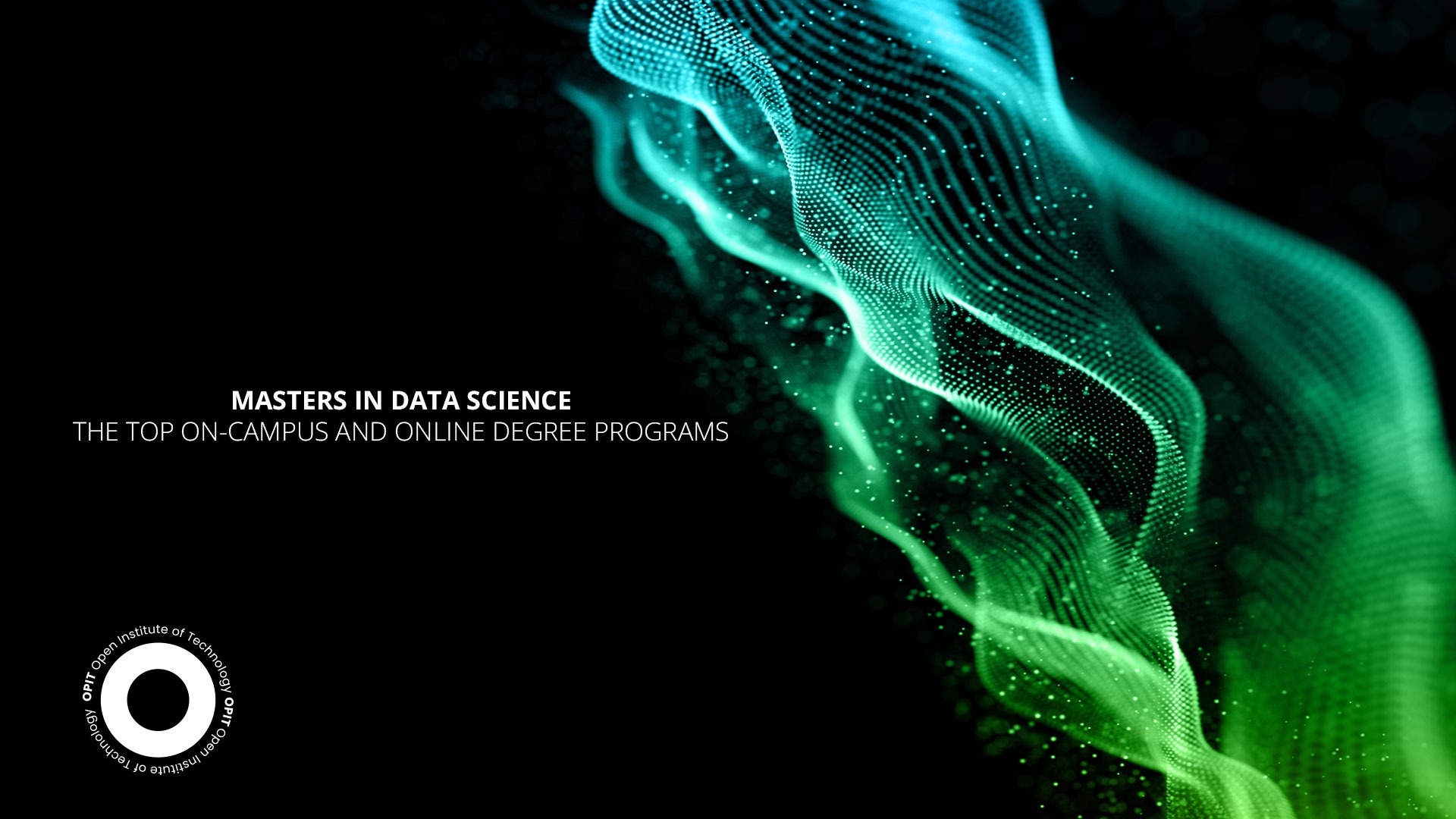As a data scientist, you bridge the gap between the data a company collects and the actionable insights that the company must extract from this data to succeed. That’s reflected in the salary you can command, with Glassdoor showing us that the average salary in Germany for a data scientist is €63,500, with the potential to hit the €80,000 range.
But you can’t turn up at a company and simply proclaim yourself a data scientist. You need to master the analytical and algorithmic tools data scientists use, along with a solid foundation in the AI technologies pervading the data science space now and in the future. An MSc data science program helps you develop those skills, and this article looks at four of the best (two each for on-campus and online programs) to consider.
Factors to Consider When Choosing a Data Science Master’s Program
Before taking the plunge and applying for a data science Master course, you need to get your feet wet with a little research. Consider the following factors, ranging from the course’s content to its ability to help you land a job.
Program Reputation
A good reputation, both for the program and the institution that provides it, can make the difference between getting a call for an interview or having your CV end up in the trash. Look for accredited universities that deliver courses with provable results.
Curriculum
While everyone who studies for a Master’s in data science has the main goal of being a data scientist, the area you wish to work on impacts your decision. Check the course curriculum to ensure you’re getting what you need on the theoretical, practical, and specific industry levels to make the course worthwhile.
Faculty Expertise and Research Opportunities
Any qualification you earn is only as good as the people behind the course providing that qualification. For a Master’s degree, look for faculty that has demonstrable industry experience, a solid track record of teaching, and the ability to provide research opportunities you can use to beef up your CV.
Industry Connections
As nice as the piece of paper you get upon completing a degree may be, what’s nicer is when that piece of paper comes from a course that gets you directly into a career. Look for established industry connections with big players and an alumni network filled with students who’ve gone on to work in the types of roles that appeal to you.
Program Duration and Flexibility
Life often gets in the way of education. Having commitments to work, family, and personal endeavors can make a full-time course unfeasible. Look for a course that fits around your schedule, whatever that may be, and offers enough flexibility for you to commit time when you can.
Check out OPIT degrees
-
Career aligned
-
Fully Online
-
EU-accredited institution
Top On-Campus MSc Data Science Programs
Being on campus during your studies gives you a chance to participate in a university’s research projects in person. Plus, you’ll work directly with faculty and meet peers who share your passion for data science and may have a few entrepreneurial ideas for you to latch on to. These are the two best data science Master course options for those who want the on-campus experience.
Master’s in Data Science (ETH Zurich)
Developed by an institution that consistently ranks as one of the world’s top 10 providers of computer science education, this course combines theory with practice. You’ll learn about the concepts underpinning data science and how those concepts apply to industries as diverse as medicine, finances, and environmental research. But the true standout is ETH Zurich’s Data Science Laboratory, where you’ll put your theoretical knowledge into practice by experimenting with real-world data science problems.
The course is delivered in English, meaning you must provide a certificate of English language proficiency at level C1 or higher to apply. Assuming you meet the language requirements, you’ll also need a BSc (or equivalent) offering at least 180 ECTS credits in a technical subject, such as computer science, physics, or math. You’ll pay CHF 730 (approx. €749) per semester for the two-year course, with the program taking no more than eight semesters to complete. Hitting the minimum four semesters means you pay about €2,996 in total, depending on the CHF-to-euro exchange rate.
Master of Science in Data Science (University College London)
University College London (UCL) offers a choice between a one-year full-time program and a two-year part-time program, with international students usually paying more than UK-based students. You need to shell out £38,300 (approx. €44,000) for this Master’s in data science. The course may seem expensive for those on a budget, though help is offered through UCL’s Financial Assistance Fund for Postgraduate Students. You’ll only get access to this fund if you can demonstrate that you’re in financial hardship and have taken all available provisions (such as applying for a student loan) available to escape that hardship.
Moving away from the unpleasantness of such high tuition fees, UCL delivers a data science program that starts with the basic theory of machine learning and ends with a research project to demonstrate your knowledge. Admission is tough – the university received 20 applications per available place in 2022. But you get a degree with accreditation from the Royal Society of Statistics if you’re willing to invest the money and are a proven high-performer in a technical subject.
Online and Part-Time MSc Data Science Programs
An online data science Master degree usually comes with two advantages over on-campus options – lower fees and more flexibility. These two courses stand out in the online space.
Master in Applied Data Science & AI (OPIT)
It’s the word “applied” that makes OPIT’s Master’s program stand out as it tells you that you’re going to learn so much more than basic theory in this course. That’s not to say you won’t learn theory, with topics like AI, machine learning, and problem-solving practices all on the docket in the first term of this 18-month course. But the second term challenges you to put all of that knowledge to the test by confronting you with real-world problems, followed by a third term that offers either an internship or an in-depth project.
Tuition fees vary depending on when you apply for the course. You’ll spend €6,500 when paying the full price, though early birds can get on board for €4,950, saving over €1,500 in the process. There’s also an option for a fast-tracked 12-month course (the same tuition fees apply) for people who can dedicate a little more time per week to their education. As for admissions, a BSc degree in almost any field is enough for you to get through the basic entry criteria. International students must demonstrate English language proficiency up to the B2 level, and OPIT has its own English certification program to help with that.
Master of Science in Applied Data Science (University of Southern California Online)
With the online version of its Master’s in data science program, the University of Southern California (USC) makes a top-class education available to European and international students. The selling point is simple – equip you with the skills you need to work as a data scientist. To do that, the course starts with the basics of Python and how to use this popular programming language to navigate your way through complex datasets. As you progress, you’ll face more real-world problems in data management and visualization that echo those you’ll find in industry.
The online program is offered as a full-time two-year course or part-time three-year version, and you can expect to pay $2,424 (approx. €2,240) per credit unit. A successful applicant will usually have a BSc in an engineering-related course, or one in computer science, math, statistics, or a similar numbers-centric field.
Check out OPIT degrees
-
Career aligned
-
Fully Online
-
EU-accredited institution
Tips for a Successful Application to a Top MSc Data Science Program
Maybe you’ve found the perfect Master’s in data science among the four in this article, or you have your eye on a different course entirely. Either way, you have a hurdle to jump – the application process. Follow these tips to craft an application that increases your chances of being the student who gets chosen from applicant pools that can number in the hundreds.
- Craft a strong personal statement to show your university of choice who you are as a person away from whatever accomplishments you list on your CV.
- Get recommendations from appropriate people (ideally previous teachers or employers in data science-related fields) to show you have people who can vouch for you.
- Demonstrate relevant work experience wherever you can (internships are your friend) or showcase academic projects related to data science.
- Spend time preparing for interviews by learning as much as possible about the interviewer and their process.
- Ensure you meet the minimum requirements regarding English language proficiency and previous degree-level experience.
Online or Off – Find the Data Science Master Degree That Works for You
By pursuing a data science Master course, you set off on a journey that prepares you for a future where Big Data (and the models that parse through that data) are king. Each of the four programs here prepares you for that future, albeit in different ways, and each puts you in line for a career that averages in the high five figures and has the potential to grow even further.






